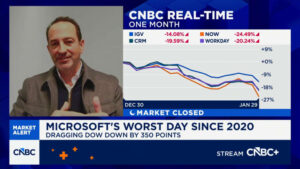I’ve been searching the FTSE 100 for the best dividend-paying bargain shares to buy. Should I buy these blue-chip shares for passive income?
Barratt Developments
Right now I’m considering adding more Barratt Developments (LSE:BDEV) shares to my investment portfolio.
I expect profits here to rise steadily over the long term. The pace of population growth in the UK looks set to continue outstripping housebuilding rates. And so I predict property prices will resume their strong record of growth once current turbulence subsides.
Housebuilder Barratt is especially attractive to me at current prices. The FTSE 100 firm trades on a forward price-to-earnings (P/E) ratio of just 6.9 times. Its corresponding dividend yield, meanwhile, sits at a passive income-boosting 7.2%.
But I’m not prepared to pull the trigger just yet. This is because key housing data remains mixed. And I believe profits and dividends may come in lower than expected over the short-to-medium term as mortgage costs rise and the domestic economy struggles.
Today Rightmove announced that UK home sales have returned to pre-pandemic levels for the first time since the disastrous mini-budget September. They were down just 1% last month versus levels recorded in March 2019.
However, most recent Nationwide data showed average home prices drop 3.1% in March, the biggest drop since 2009.
The trading outlook for Barratt and its peers remains as clear as mud. But things could worsen if, as expected, the Bank of England keeps hiking interest rates and the British economy slumps. For the time being, I’ll wait until market conditions become clearer before investing.
Lloyds Banking Group
I’d be much happier buying shares in Barratt than Lloyds Banking Group (LSE:LLOY), however.
I’m not moved by the FTSE bank’s 5.6% forward dividend yield. Nor does its undemanding prospective P/E ratio of 6.6 times tempt me to invest. I think the potential risks it poses to investors make it a dividend stock to avoid at all costs.
Like Barratt, Lloyds stands to suffer badly in the event of a long housing market downturn. The bank is Britain’s biggest mortgage lender with a market share of around 20%. It is therefore vulnerable to a revenues slump should home sales dry up.
But Lloyds’ troubles are far and wide. If the domestic economy struggles, income could sink and bad loans might surge across all of its operations. And worryingly, the outlook for the UK over the next few years is grim.
Just yesterday the International Monetary Fund said it expects British GDP to shrink 0.3% in 2023. As such it is predicted to be the worst-performing of the world’s largest 20 economies.
If this wasn’t bad enough, established banks like Lloyds also face being battered by the growing popularity of digital-led banks.
On the plus side, interest rates are tipped to rise further in the months ahead. And they could remain higher than expected if inflationary pressures persist. This would boost the money banks make from their lending activities.
Yet on balance I think the dangers of owning Lloyds share far outweigh the potential benefits. I’d much rather buy other FTSE 100 shares for passive income right now.
This post was originally published on Motley Fool







